7BSP1085: Cross-Cultural Marketing Plan for Global Expansion
VerifiedAdded on 2023/04/21
|15
|3543
|468
Report
AI Summary
This report provides a detailed analysis of marketing across cultures, focusing on the University of Hertfordshire's expansion into the private tertiary educational sector in Kenya and Chile. It examines product and market-related issues, conducts a SWOT analysis, and proposes an action plan incorporating standardized and adaptive strategies. The report also applies Hofstede's cultural dimensions theory to understand and navigate cultural differences. The analysis considers political, economic, social, and technological factors in both countries, addressing challenges such as political instability, economic constraints, and cultural nuances. The overall goal is to provide a framework for the University of Hertfordshire to effectively adapt to local cultures, attract students, and achieve sustainable growth in the competitive international education market. Desklib provides similar solved assignments and past papers for students.

Running head: MARKETING ACROSS CULTURES
Marketing across cultures
Name of student
Name of University
Author note
Marketing across cultures
Name of student
Name of University
Author note
Paraphrase This Document
Need a fresh take? Get an instant paraphrase of this document with our AI Paraphraser
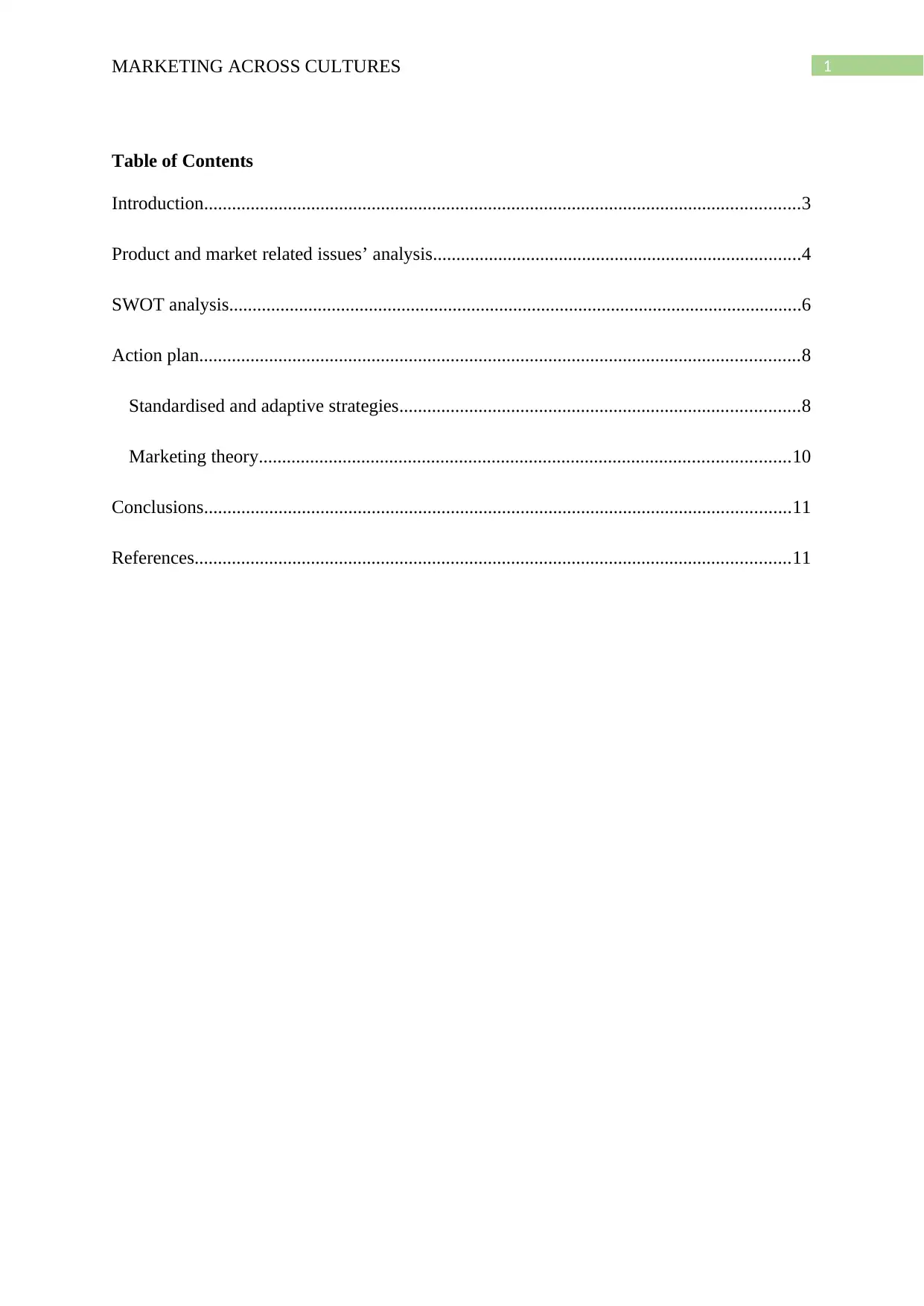
1MARKETING ACROSS CULTURES
Table of Contents
Introduction................................................................................................................................3
Product and market related issues’ analysis...............................................................................4
SWOT analysis...........................................................................................................................6
Action plan.................................................................................................................................8
Standardised and adaptive strategies......................................................................................8
Marketing theory..................................................................................................................10
Conclusions..............................................................................................................................11
References................................................................................................................................11
Table of Contents
Introduction................................................................................................................................3
Product and market related issues’ analysis...............................................................................4
SWOT analysis...........................................................................................................................6
Action plan.................................................................................................................................8
Standardised and adaptive strategies......................................................................................8
Marketing theory..................................................................................................................10
Conclusions..............................................................................................................................11
References................................................................................................................................11
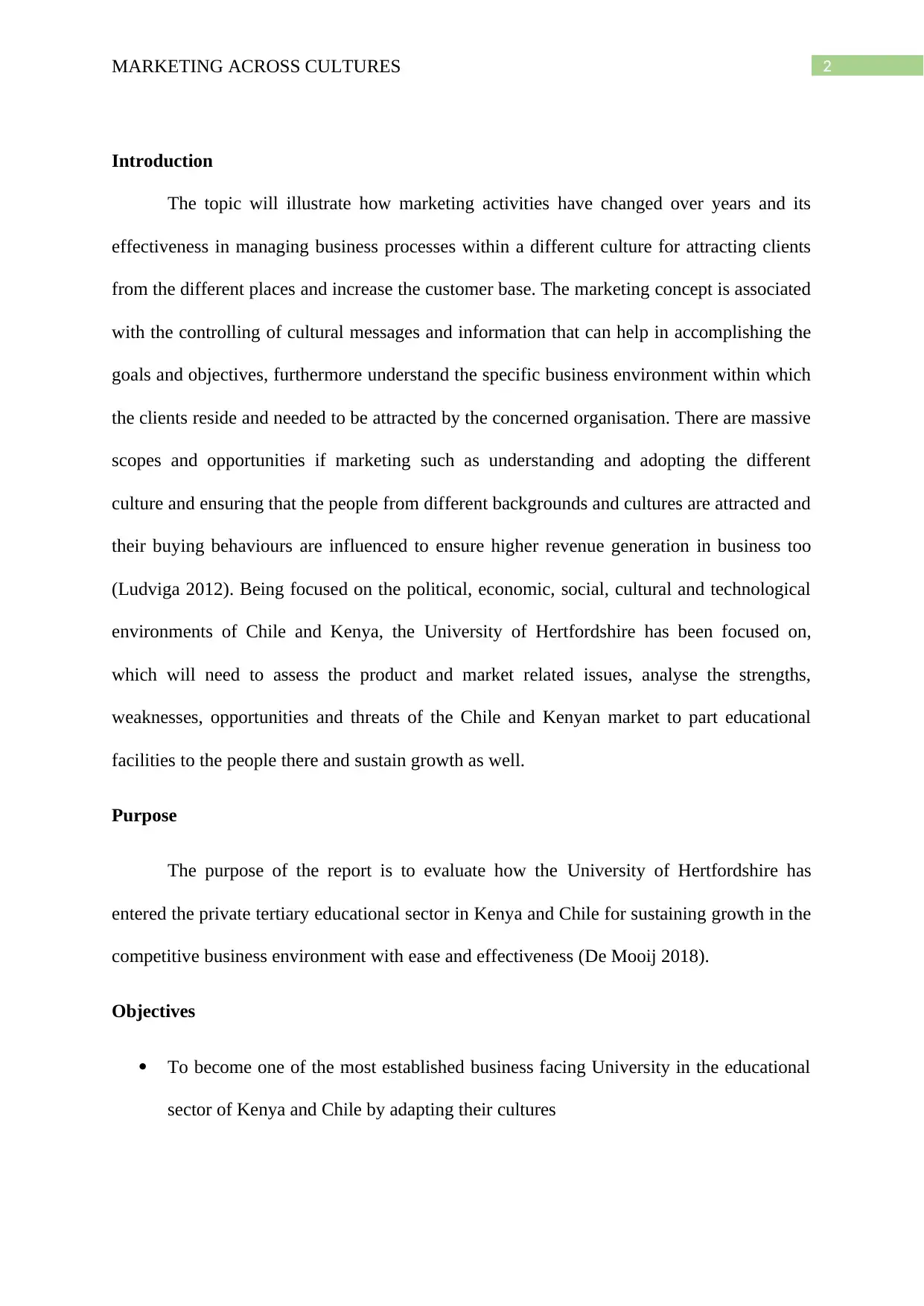
2MARKETING ACROSS CULTURES
Introduction
The topic will illustrate how marketing activities have changed over years and its
effectiveness in managing business processes within a different culture for attracting clients
from the different places and increase the customer base. The marketing concept is associated
with the controlling of cultural messages and information that can help in accomplishing the
goals and objectives, furthermore understand the specific business environment within which
the clients reside and needed to be attracted by the concerned organisation. There are massive
scopes and opportunities if marketing such as understanding and adopting the different
culture and ensuring that the people from different backgrounds and cultures are attracted and
their buying behaviours are influenced to ensure higher revenue generation in business too
(Ludviga 2012). Being focused on the political, economic, social, cultural and technological
environments of Chile and Kenya, the University of Hertfordshire has been focused on,
which will need to assess the product and market related issues, analyse the strengths,
weaknesses, opportunities and threats of the Chile and Kenyan market to part educational
facilities to the people there and sustain growth as well.
Purpose
The purpose of the report is to evaluate how the University of Hertfordshire has
entered the private tertiary educational sector in Kenya and Chile for sustaining growth in the
competitive business environment with ease and effectiveness (De Mooij 2018).
Objectives
To become one of the most established business facing University in the educational
sector of Kenya and Chile by adapting their cultures
Introduction
The topic will illustrate how marketing activities have changed over years and its
effectiveness in managing business processes within a different culture for attracting clients
from the different places and increase the customer base. The marketing concept is associated
with the controlling of cultural messages and information that can help in accomplishing the
goals and objectives, furthermore understand the specific business environment within which
the clients reside and needed to be attracted by the concerned organisation. There are massive
scopes and opportunities if marketing such as understanding and adopting the different
culture and ensuring that the people from different backgrounds and cultures are attracted and
their buying behaviours are influenced to ensure higher revenue generation in business too
(Ludviga 2012). Being focused on the political, economic, social, cultural and technological
environments of Chile and Kenya, the University of Hertfordshire has been focused on,
which will need to assess the product and market related issues, analyse the strengths,
weaknesses, opportunities and threats of the Chile and Kenyan market to part educational
facilities to the people there and sustain growth as well.
Purpose
The purpose of the report is to evaluate how the University of Hertfordshire has
entered the private tertiary educational sector in Kenya and Chile for sustaining growth in the
competitive business environment with ease and effectiveness (De Mooij 2018).
Objectives
To become one of the most established business facing University in the educational
sector of Kenya and Chile by adapting their cultures
⊘ This is a preview!⊘
Do you want full access?
Subscribe today to unlock all pages.

Trusted by 1+ million students worldwide
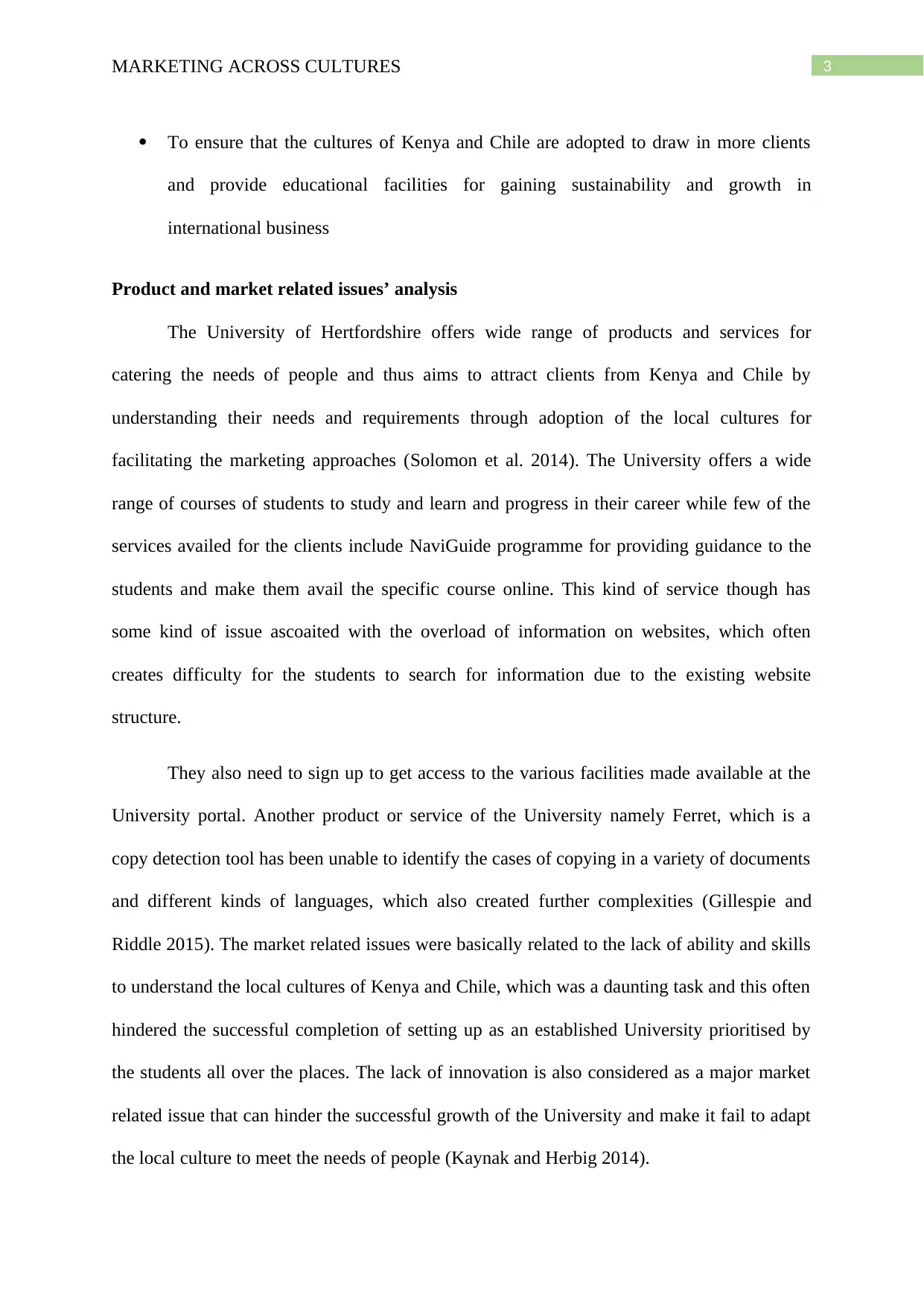
3MARKETING ACROSS CULTURES
To ensure that the cultures of Kenya and Chile are adopted to draw in more clients
and provide educational facilities for gaining sustainability and growth in
international business
Product and market related issues’ analysis
The University of Hertfordshire offers wide range of products and services for
catering the needs of people and thus aims to attract clients from Kenya and Chile by
understanding their needs and requirements through adoption of the local cultures for
facilitating the marketing approaches (Solomon et al. 2014). The University offers a wide
range of courses of students to study and learn and progress in their career while few of the
services availed for the clients include NaviGuide programme for providing guidance to the
students and make them avail the specific course online. This kind of service though has
some kind of issue ascoaited with the overload of information on websites, which often
creates difficulty for the students to search for information due to the existing website
structure.
They also need to sign up to get access to the various facilities made available at the
University portal. Another product or service of the University namely Ferret, which is a
copy detection tool has been unable to identify the cases of copying in a variety of documents
and different kinds of languages, which also created further complexities (Gillespie and
Riddle 2015). The market related issues were basically related to the lack of ability and skills
to understand the local cultures of Kenya and Chile, which was a daunting task and this often
hindered the successful completion of setting up as an established University prioritised by
the students all over the places. The lack of innovation is also considered as a major market
related issue that can hinder the successful growth of the University and make it fail to adapt
the local culture to meet the needs of people (Kaynak and Herbig 2014).
To ensure that the cultures of Kenya and Chile are adopted to draw in more clients
and provide educational facilities for gaining sustainability and growth in
international business
Product and market related issues’ analysis
The University of Hertfordshire offers wide range of products and services for
catering the needs of people and thus aims to attract clients from Kenya and Chile by
understanding their needs and requirements through adoption of the local cultures for
facilitating the marketing approaches (Solomon et al. 2014). The University offers a wide
range of courses of students to study and learn and progress in their career while few of the
services availed for the clients include NaviGuide programme for providing guidance to the
students and make them avail the specific course online. This kind of service though has
some kind of issue ascoaited with the overload of information on websites, which often
creates difficulty for the students to search for information due to the existing website
structure.
They also need to sign up to get access to the various facilities made available at the
University portal. Another product or service of the University namely Ferret, which is a
copy detection tool has been unable to identify the cases of copying in a variety of documents
and different kinds of languages, which also created further complexities (Gillespie and
Riddle 2015). The market related issues were basically related to the lack of ability and skills
to understand the local cultures of Kenya and Chile, which was a daunting task and this often
hindered the successful completion of setting up as an established University prioritised by
the students all over the places. The lack of innovation is also considered as a major market
related issue that can hinder the successful growth of the University and make it fail to adapt
the local culture to meet the needs of people (Kaynak and Herbig 2014).
Paraphrase This Document
Need a fresh take? Get an instant paraphrase of this document with our AI Paraphraser
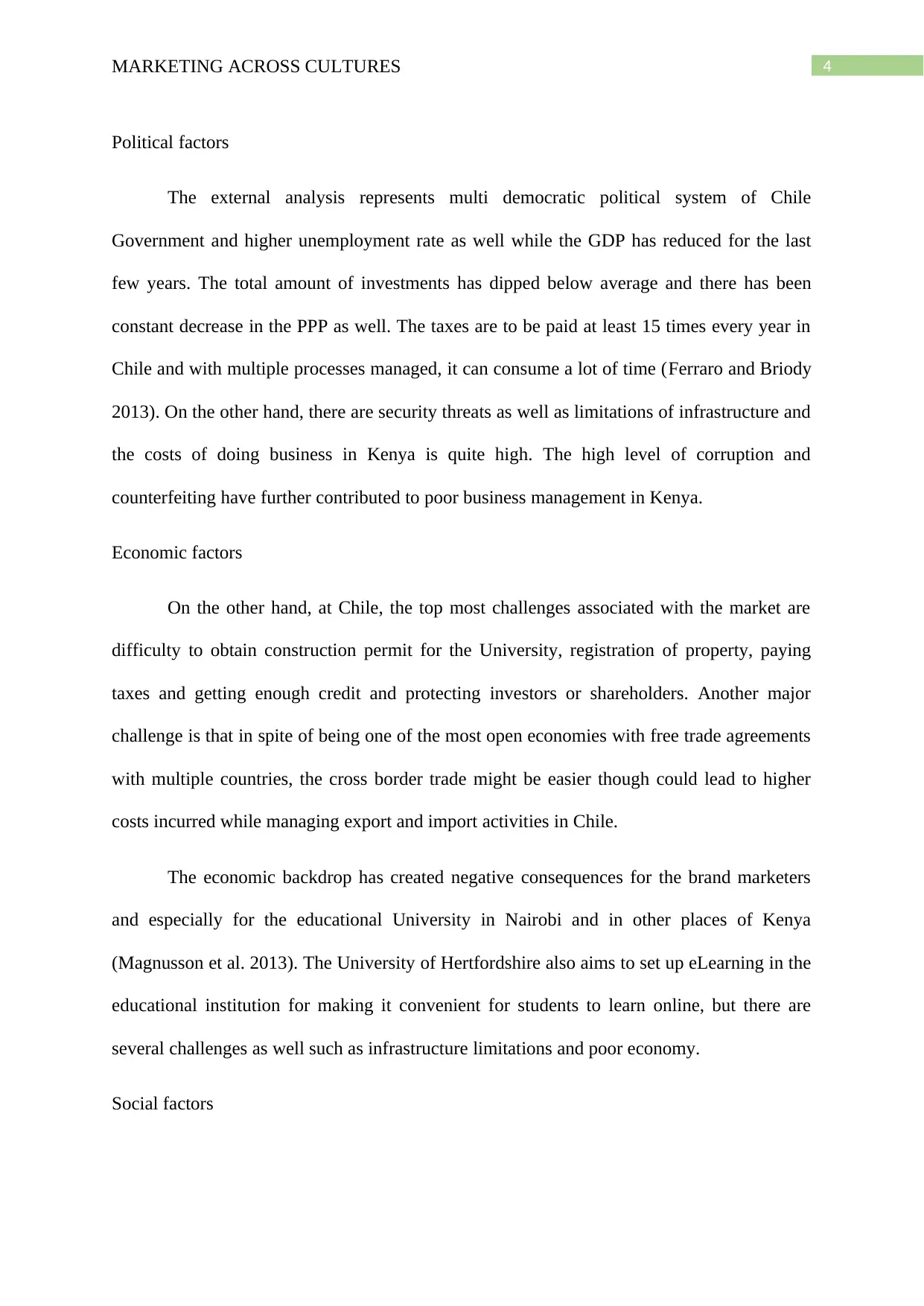
4MARKETING ACROSS CULTURES
Political factors
The external analysis represents multi democratic political system of Chile
Government and higher unemployment rate as well while the GDP has reduced for the last
few years. The total amount of investments has dipped below average and there has been
constant decrease in the PPP as well. The taxes are to be paid at least 15 times every year in
Chile and with multiple processes managed, it can consume a lot of time (Ferraro and Briody
2013). On the other hand, there are security threats as well as limitations of infrastructure and
the costs of doing business in Kenya is quite high. The high level of corruption and
counterfeiting have further contributed to poor business management in Kenya.
Economic factors
On the other hand, at Chile, the top most challenges associated with the market are
difficulty to obtain construction permit for the University, registration of property, paying
taxes and getting enough credit and protecting investors or shareholders. Another major
challenge is that in spite of being one of the most open economies with free trade agreements
with multiple countries, the cross border trade might be easier though could lead to higher
costs incurred while managing export and import activities in Chile.
The economic backdrop has created negative consequences for the brand marketers
and especially for the educational University in Nairobi and in other places of Kenya
(Magnusson et al. 2013). The University of Hertfordshire also aims to set up eLearning in the
educational institution for making it convenient for students to learn online, but there are
several challenges as well such as infrastructure limitations and poor economy.
Social factors
Political factors
The external analysis represents multi democratic political system of Chile
Government and higher unemployment rate as well while the GDP has reduced for the last
few years. The total amount of investments has dipped below average and there has been
constant decrease in the PPP as well. The taxes are to be paid at least 15 times every year in
Chile and with multiple processes managed, it can consume a lot of time (Ferraro and Briody
2013). On the other hand, there are security threats as well as limitations of infrastructure and
the costs of doing business in Kenya is quite high. The high level of corruption and
counterfeiting have further contributed to poor business management in Kenya.
Economic factors
On the other hand, at Chile, the top most challenges associated with the market are
difficulty to obtain construction permit for the University, registration of property, paying
taxes and getting enough credit and protecting investors or shareholders. Another major
challenge is that in spite of being one of the most open economies with free trade agreements
with multiple countries, the cross border trade might be easier though could lead to higher
costs incurred while managing export and import activities in Chile.
The economic backdrop has created negative consequences for the brand marketers
and especially for the educational University in Nairobi and in other places of Kenya
(Magnusson et al. 2013). The University of Hertfordshire also aims to set up eLearning in the
educational institution for making it convenient for students to learn online, but there are
several challenges as well such as infrastructure limitations and poor economy.
Social factors
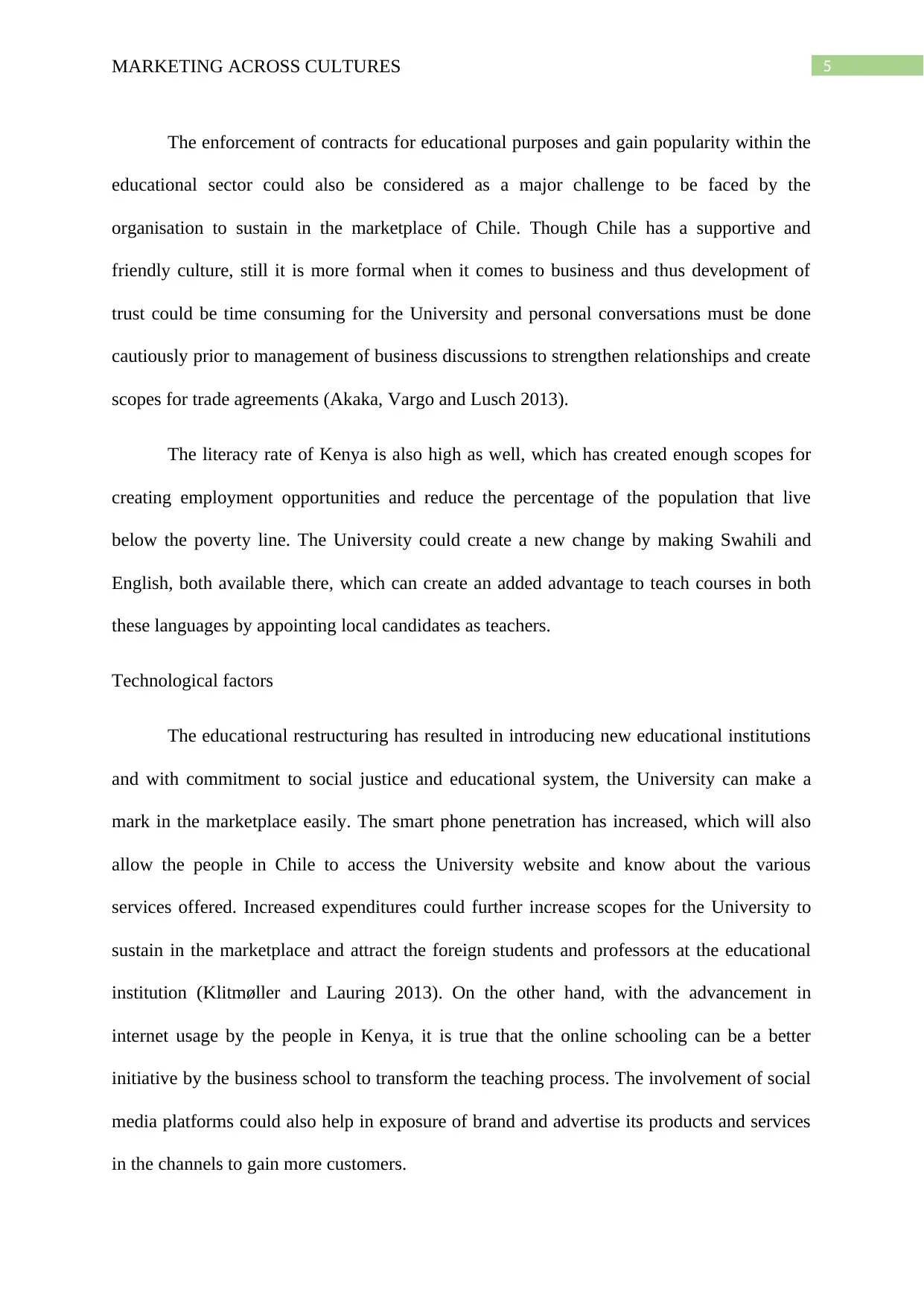
5MARKETING ACROSS CULTURES
The enforcement of contracts for educational purposes and gain popularity within the
educational sector could also be considered as a major challenge to be faced by the
organisation to sustain in the marketplace of Chile. Though Chile has a supportive and
friendly culture, still it is more formal when it comes to business and thus development of
trust could be time consuming for the University and personal conversations must be done
cautiously prior to management of business discussions to strengthen relationships and create
scopes for trade agreements (Akaka, Vargo and Lusch 2013).
The literacy rate of Kenya is also high as well, which has created enough scopes for
creating employment opportunities and reduce the percentage of the population that live
below the poverty line. The University could create a new change by making Swahili and
English, both available there, which can create an added advantage to teach courses in both
these languages by appointing local candidates as teachers.
Technological factors
The educational restructuring has resulted in introducing new educational institutions
and with commitment to social justice and educational system, the University can make a
mark in the marketplace easily. The smart phone penetration has increased, which will also
allow the people in Chile to access the University website and know about the various
services offered. Increased expenditures could further increase scopes for the University to
sustain in the marketplace and attract the foreign students and professors at the educational
institution (Klitmøller and Lauring 2013). On the other hand, with the advancement in
internet usage by the people in Kenya, it is true that the online schooling can be a better
initiative by the business school to transform the teaching process. The involvement of social
media platforms could also help in exposure of brand and advertise its products and services
in the channels to gain more customers.
The enforcement of contracts for educational purposes and gain popularity within the
educational sector could also be considered as a major challenge to be faced by the
organisation to sustain in the marketplace of Chile. Though Chile has a supportive and
friendly culture, still it is more formal when it comes to business and thus development of
trust could be time consuming for the University and personal conversations must be done
cautiously prior to management of business discussions to strengthen relationships and create
scopes for trade agreements (Akaka, Vargo and Lusch 2013).
The literacy rate of Kenya is also high as well, which has created enough scopes for
creating employment opportunities and reduce the percentage of the population that live
below the poverty line. The University could create a new change by making Swahili and
English, both available there, which can create an added advantage to teach courses in both
these languages by appointing local candidates as teachers.
Technological factors
The educational restructuring has resulted in introducing new educational institutions
and with commitment to social justice and educational system, the University can make a
mark in the marketplace easily. The smart phone penetration has increased, which will also
allow the people in Chile to access the University website and know about the various
services offered. Increased expenditures could further increase scopes for the University to
sustain in the marketplace and attract the foreign students and professors at the educational
institution (Klitmøller and Lauring 2013). On the other hand, with the advancement in
internet usage by the people in Kenya, it is true that the online schooling can be a better
initiative by the business school to transform the teaching process. The involvement of social
media platforms could also help in exposure of brand and advertise its products and services
in the channels to gain more customers.
⊘ This is a preview!⊘
Do you want full access?
Subscribe today to unlock all pages.

Trusted by 1+ million students worldwide
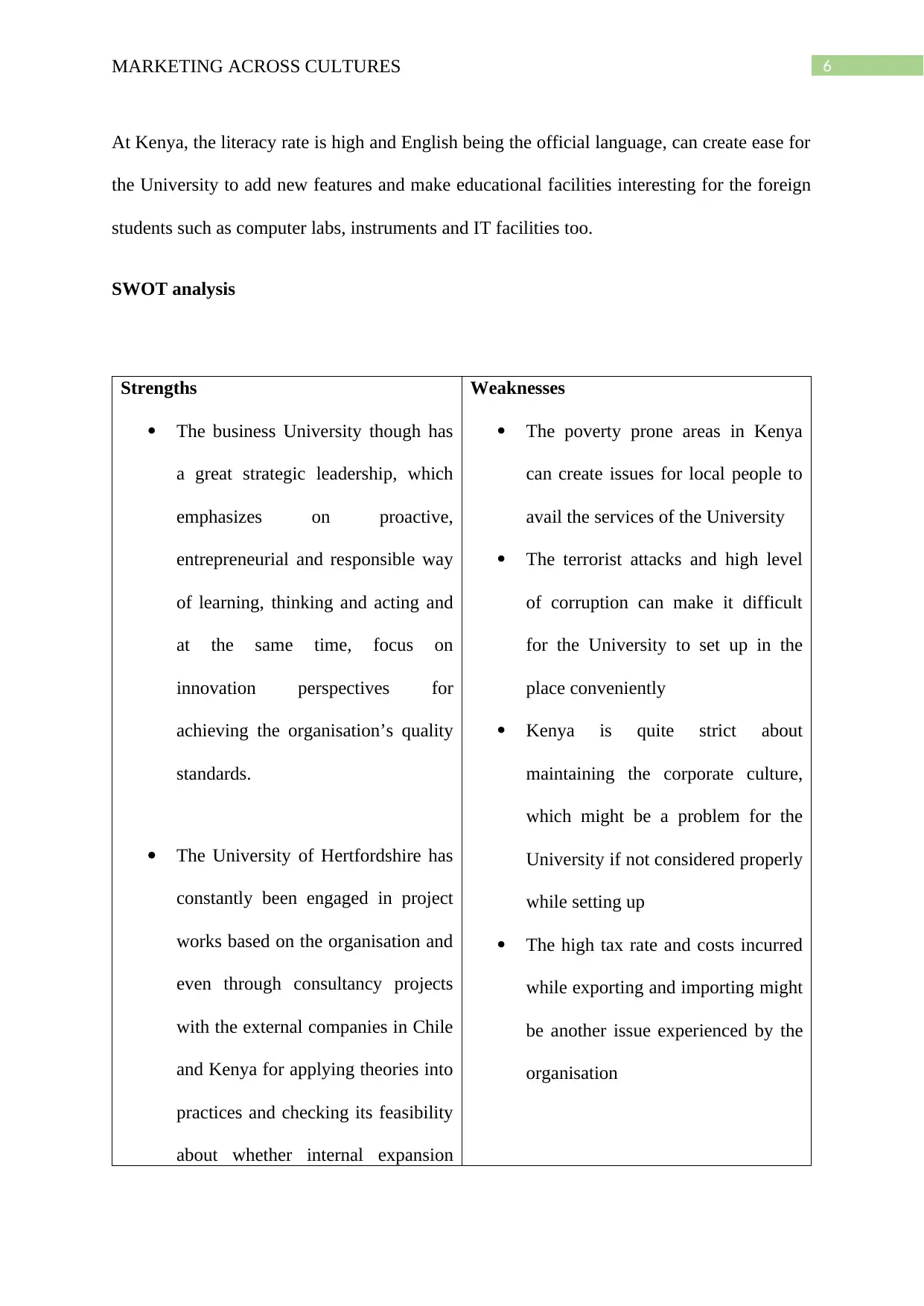
6MARKETING ACROSS CULTURES
At Kenya, the literacy rate is high and English being the official language, can create ease for
the University to add new features and make educational facilities interesting for the foreign
students such as computer labs, instruments and IT facilities too.
SWOT analysis
Strengths
The business University though has
a great strategic leadership, which
emphasizes on proactive,
entrepreneurial and responsible way
of learning, thinking and acting and
at the same time, focus on
innovation perspectives for
achieving the organisation’s quality
standards.
The University of Hertfordshire has
constantly been engaged in project
works based on the organisation and
even through consultancy projects
with the external companies in Chile
and Kenya for applying theories into
practices and checking its feasibility
about whether internal expansion
Weaknesses
The poverty prone areas in Kenya
can create issues for local people to
avail the services of the University
The terrorist attacks and high level
of corruption can make it difficult
for the University to set up in the
place conveniently
Kenya is quite strict about
maintaining the corporate culture,
which might be a problem for the
University if not considered properly
while setting up
The high tax rate and costs incurred
while exporting and importing might
be another issue experienced by the
organisation
At Kenya, the literacy rate is high and English being the official language, can create ease for
the University to add new features and make educational facilities interesting for the foreign
students such as computer labs, instruments and IT facilities too.
SWOT analysis
Strengths
The business University though has
a great strategic leadership, which
emphasizes on proactive,
entrepreneurial and responsible way
of learning, thinking and acting and
at the same time, focus on
innovation perspectives for
achieving the organisation’s quality
standards.
The University of Hertfordshire has
constantly been engaged in project
works based on the organisation and
even through consultancy projects
with the external companies in Chile
and Kenya for applying theories into
practices and checking its feasibility
about whether internal expansion
Weaknesses
The poverty prone areas in Kenya
can create issues for local people to
avail the services of the University
The terrorist attacks and high level
of corruption can make it difficult
for the University to set up in the
place conveniently
Kenya is quite strict about
maintaining the corporate culture,
which might be a problem for the
University if not considered properly
while setting up
The high tax rate and costs incurred
while exporting and importing might
be another issue experienced by the
organisation
Paraphrase This Document
Need a fresh take? Get an instant paraphrase of this document with our AI Paraphraser
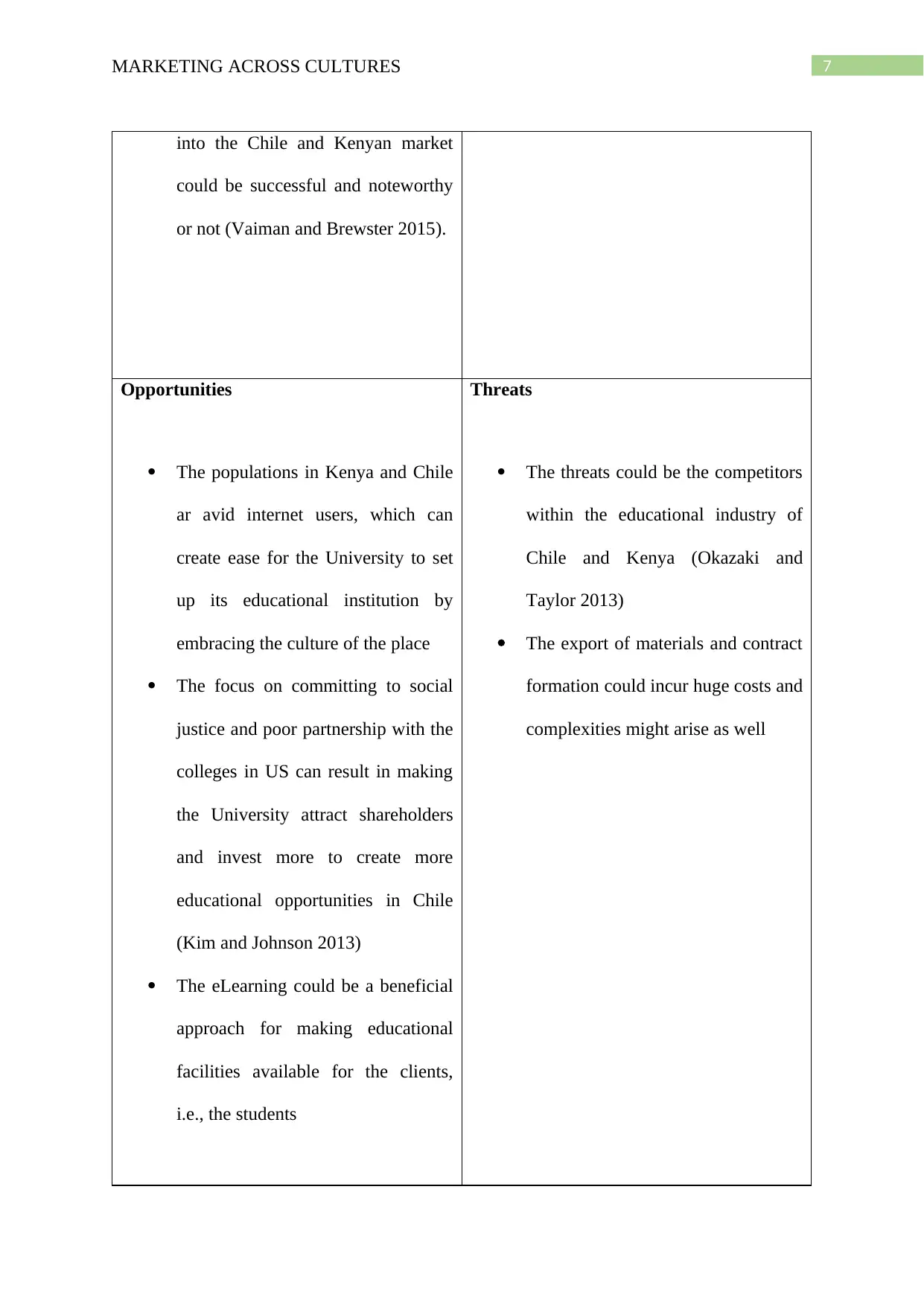
7MARKETING ACROSS CULTURES
into the Chile and Kenyan market
could be successful and noteworthy
or not (Vaiman and Brewster 2015).
Opportunities
The populations in Kenya and Chile
ar avid internet users, which can
create ease for the University to set
up its educational institution by
embracing the culture of the place
The focus on committing to social
justice and poor partnership with the
colleges in US can result in making
the University attract shareholders
and invest more to create more
educational opportunities in Chile
(Kim and Johnson 2013)
The eLearning could be a beneficial
approach for making educational
facilities available for the clients,
i.e., the students
Threats
The threats could be the competitors
within the educational industry of
Chile and Kenya (Okazaki and
Taylor 2013)
The export of materials and contract
formation could incur huge costs and
complexities might arise as well
into the Chile and Kenyan market
could be successful and noteworthy
or not (Vaiman and Brewster 2015).
Opportunities
The populations in Kenya and Chile
ar avid internet users, which can
create ease for the University to set
up its educational institution by
embracing the culture of the place
The focus on committing to social
justice and poor partnership with the
colleges in US can result in making
the University attract shareholders
and invest more to create more
educational opportunities in Chile
(Kim and Johnson 2013)
The eLearning could be a beneficial
approach for making educational
facilities available for the clients,
i.e., the students
Threats
The threats could be the competitors
within the educational industry of
Chile and Kenya (Okazaki and
Taylor 2013)
The export of materials and contract
formation could incur huge costs and
complexities might arise as well
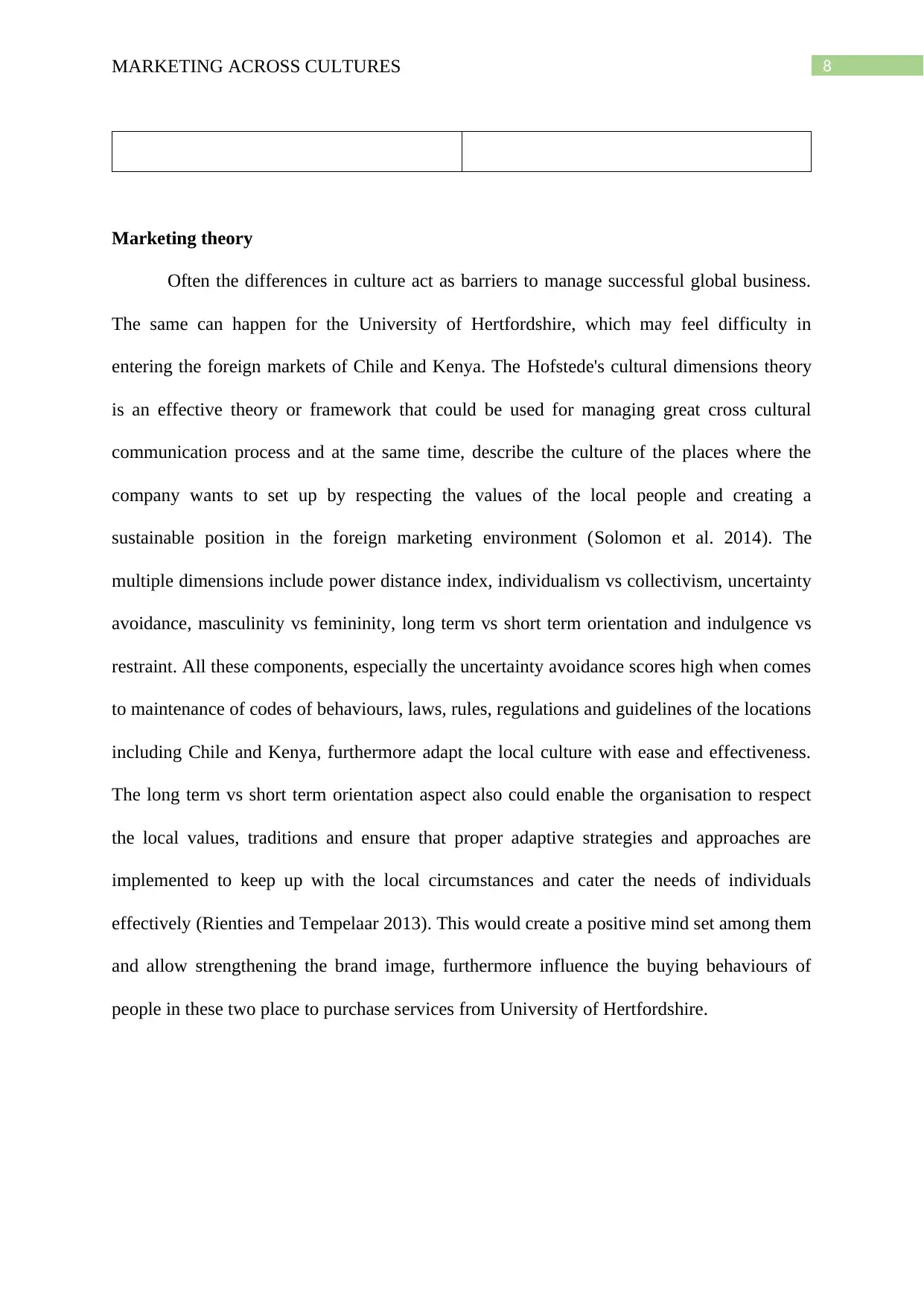
8MARKETING ACROSS CULTURES
Marketing theory
Often the differences in culture act as barriers to manage successful global business.
The same can happen for the University of Hertfordshire, which may feel difficulty in
entering the foreign markets of Chile and Kenya. The Hofstede's cultural dimensions theory
is an effective theory or framework that could be used for managing great cross cultural
communication process and at the same time, describe the culture of the places where the
company wants to set up by respecting the values of the local people and creating a
sustainable position in the foreign marketing environment (Solomon et al. 2014). The
multiple dimensions include power distance index, individualism vs collectivism, uncertainty
avoidance, masculinity vs femininity, long term vs short term orientation and indulgence vs
restraint. All these components, especially the uncertainty avoidance scores high when comes
to maintenance of codes of behaviours, laws, rules, regulations and guidelines of the locations
including Chile and Kenya, furthermore adapt the local culture with ease and effectiveness.
The long term vs short term orientation aspect also could enable the organisation to respect
the local values, traditions and ensure that proper adaptive strategies and approaches are
implemented to keep up with the local circumstances and cater the needs of individuals
effectively (Rienties and Tempelaar 2013). This would create a positive mind set among them
and allow strengthening the brand image, furthermore influence the buying behaviours of
people in these two place to purchase services from University of Hertfordshire.
Marketing theory
Often the differences in culture act as barriers to manage successful global business.
The same can happen for the University of Hertfordshire, which may feel difficulty in
entering the foreign markets of Chile and Kenya. The Hofstede's cultural dimensions theory
is an effective theory or framework that could be used for managing great cross cultural
communication process and at the same time, describe the culture of the places where the
company wants to set up by respecting the values of the local people and creating a
sustainable position in the foreign marketing environment (Solomon et al. 2014). The
multiple dimensions include power distance index, individualism vs collectivism, uncertainty
avoidance, masculinity vs femininity, long term vs short term orientation and indulgence vs
restraint. All these components, especially the uncertainty avoidance scores high when comes
to maintenance of codes of behaviours, laws, rules, regulations and guidelines of the locations
including Chile and Kenya, furthermore adapt the local culture with ease and effectiveness.
The long term vs short term orientation aspect also could enable the organisation to respect
the local values, traditions and ensure that proper adaptive strategies and approaches are
implemented to keep up with the local circumstances and cater the needs of individuals
effectively (Rienties and Tempelaar 2013). This would create a positive mind set among them
and allow strengthening the brand image, furthermore influence the buying behaviours of
people in these two place to purchase services from University of Hertfordshire.
⊘ This is a preview!⊘
Do you want full access?
Subscribe today to unlock all pages.

Trusted by 1+ million students worldwide
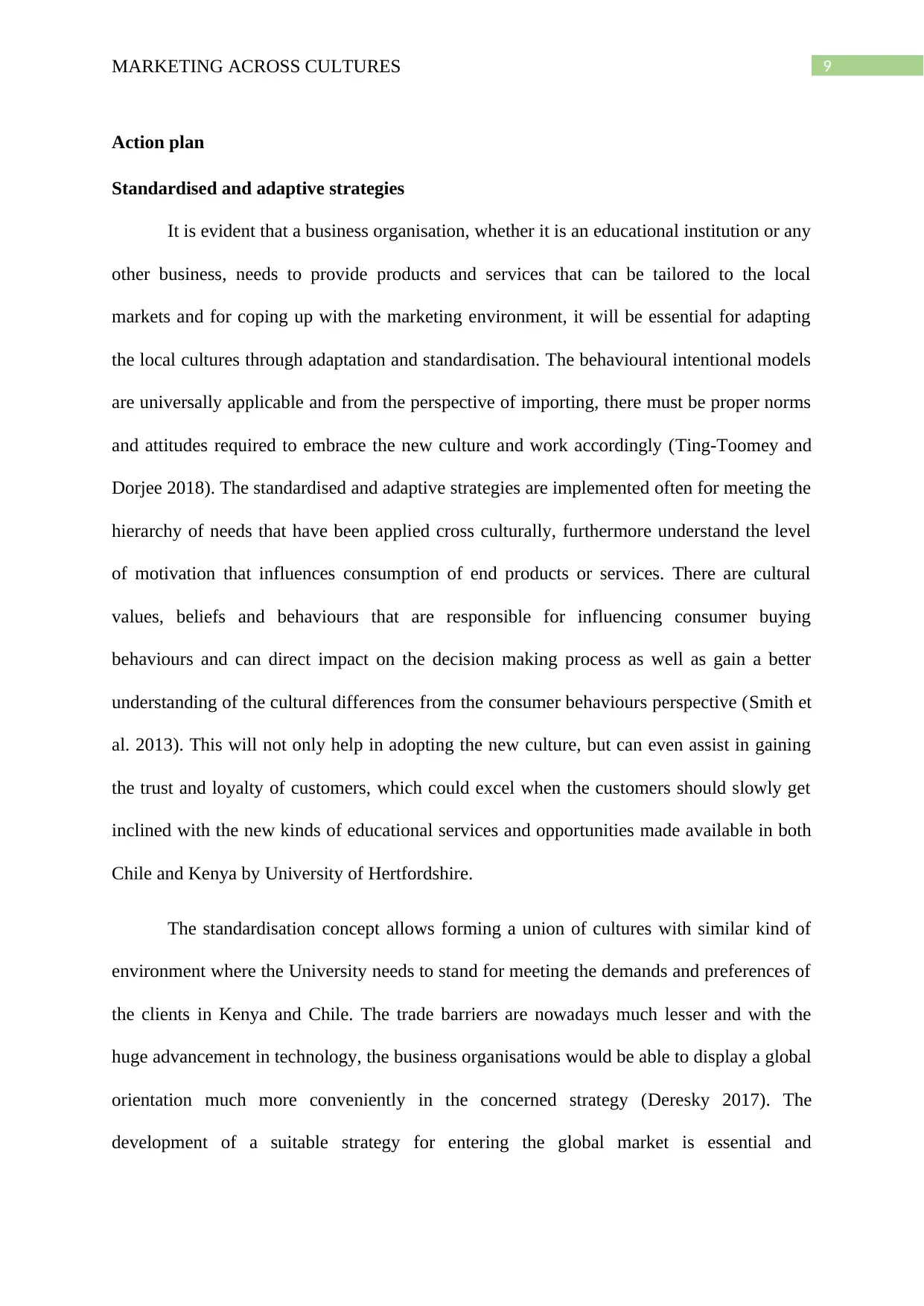
9MARKETING ACROSS CULTURES
Action plan
Standardised and adaptive strategies
It is evident that a business organisation, whether it is an educational institution or any
other business, needs to provide products and services that can be tailored to the local
markets and for coping up with the marketing environment, it will be essential for adapting
the local cultures through adaptation and standardisation. The behavioural intentional models
are universally applicable and from the perspective of importing, there must be proper norms
and attitudes required to embrace the new culture and work accordingly (Ting-Toomey and
Dorjee 2018). The standardised and adaptive strategies are implemented often for meeting the
hierarchy of needs that have been applied cross culturally, furthermore understand the level
of motivation that influences consumption of end products or services. There are cultural
values, beliefs and behaviours that are responsible for influencing consumer buying
behaviours and can direct impact on the decision making process as well as gain a better
understanding of the cultural differences from the consumer behaviours perspective (Smith et
al. 2013). This will not only help in adopting the new culture, but can even assist in gaining
the trust and loyalty of customers, which could excel when the customers should slowly get
inclined with the new kinds of educational services and opportunities made available in both
Chile and Kenya by University of Hertfordshire.
The standardisation concept allows forming a union of cultures with similar kind of
environment where the University needs to stand for meeting the demands and preferences of
the clients in Kenya and Chile. The trade barriers are nowadays much lesser and with the
huge advancement in technology, the business organisations would be able to display a global
orientation much more conveniently in the concerned strategy (Deresky 2017). The
development of a suitable strategy for entering the global market is essential and
Action plan
Standardised and adaptive strategies
It is evident that a business organisation, whether it is an educational institution or any
other business, needs to provide products and services that can be tailored to the local
markets and for coping up with the marketing environment, it will be essential for adapting
the local cultures through adaptation and standardisation. The behavioural intentional models
are universally applicable and from the perspective of importing, there must be proper norms
and attitudes required to embrace the new culture and work accordingly (Ting-Toomey and
Dorjee 2018). The standardised and adaptive strategies are implemented often for meeting the
hierarchy of needs that have been applied cross culturally, furthermore understand the level
of motivation that influences consumption of end products or services. There are cultural
values, beliefs and behaviours that are responsible for influencing consumer buying
behaviours and can direct impact on the decision making process as well as gain a better
understanding of the cultural differences from the consumer behaviours perspective (Smith et
al. 2013). This will not only help in adopting the new culture, but can even assist in gaining
the trust and loyalty of customers, which could excel when the customers should slowly get
inclined with the new kinds of educational services and opportunities made available in both
Chile and Kenya by University of Hertfordshire.
The standardisation concept allows forming a union of cultures with similar kind of
environment where the University needs to stand for meeting the demands and preferences of
the clients in Kenya and Chile. The trade barriers are nowadays much lesser and with the
huge advancement in technology, the business organisations would be able to display a global
orientation much more conveniently in the concerned strategy (Deresky 2017). The
development of a suitable strategy for entering the global market is essential and
Paraphrase This Document
Need a fresh take? Get an instant paraphrase of this document with our AI Paraphraser
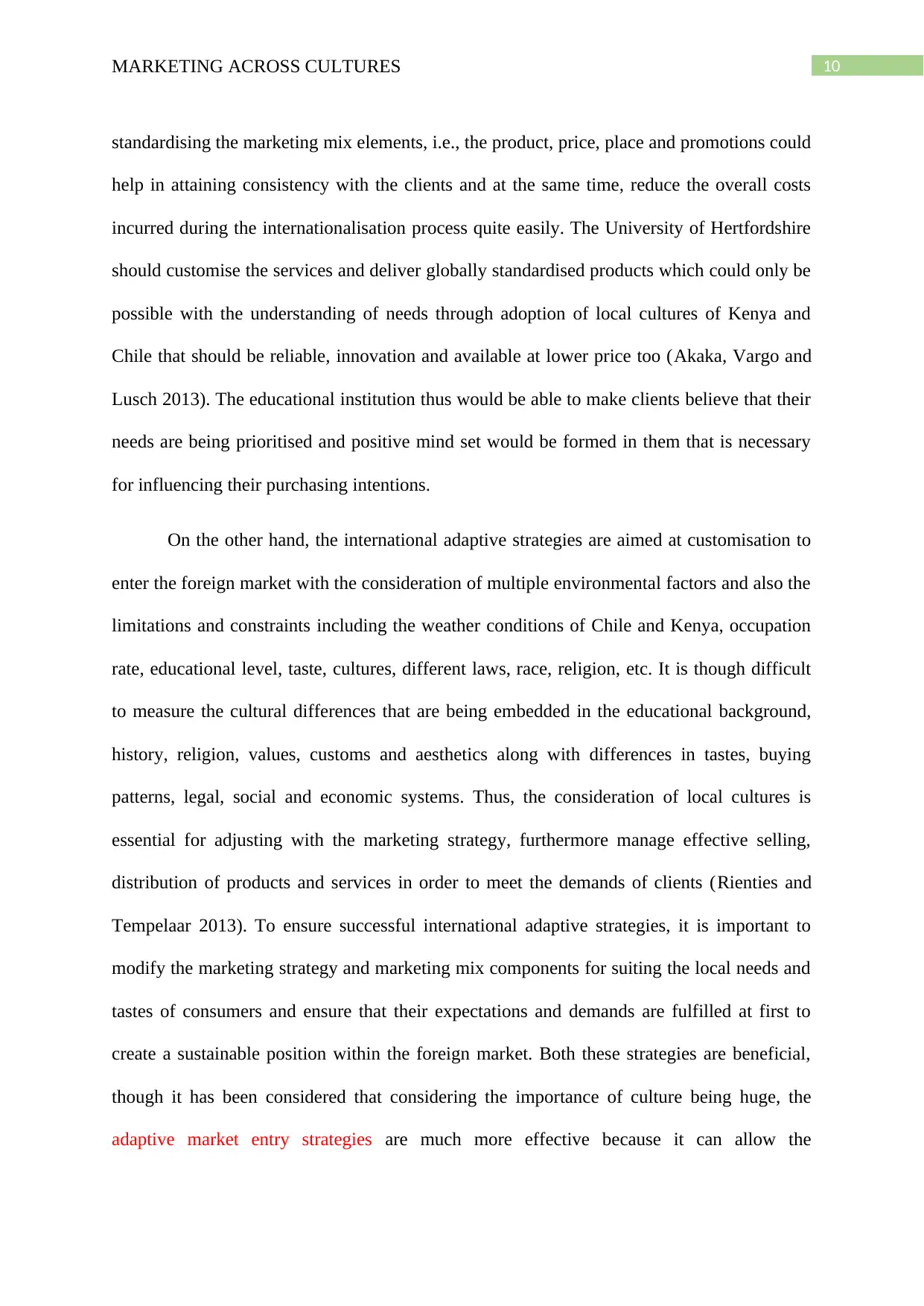
10MARKETING ACROSS CULTURES
standardising the marketing mix elements, i.e., the product, price, place and promotions could
help in attaining consistency with the clients and at the same time, reduce the overall costs
incurred during the internationalisation process quite easily. The University of Hertfordshire
should customise the services and deliver globally standardised products which could only be
possible with the understanding of needs through adoption of local cultures of Kenya and
Chile that should be reliable, innovation and available at lower price too (Akaka, Vargo and
Lusch 2013). The educational institution thus would be able to make clients believe that their
needs are being prioritised and positive mind set would be formed in them that is necessary
for influencing their purchasing intentions.
On the other hand, the international adaptive strategies are aimed at customisation to
enter the foreign market with the consideration of multiple environmental factors and also the
limitations and constraints including the weather conditions of Chile and Kenya, occupation
rate, educational level, taste, cultures, different laws, race, religion, etc. It is though difficult
to measure the cultural differences that are being embedded in the educational background,
history, religion, values, customs and aesthetics along with differences in tastes, buying
patterns, legal, social and economic systems. Thus, the consideration of local cultures is
essential for adjusting with the marketing strategy, furthermore manage effective selling,
distribution of products and services in order to meet the demands of clients (Rienties and
Tempelaar 2013). To ensure successful international adaptive strategies, it is important to
modify the marketing strategy and marketing mix components for suiting the local needs and
tastes of consumers and ensure that their expectations and demands are fulfilled at first to
create a sustainable position within the foreign market. Both these strategies are beneficial,
though it has been considered that considering the importance of culture being huge, the
adaptive market entry strategies are much more effective because it can allow the
standardising the marketing mix elements, i.e., the product, price, place and promotions could
help in attaining consistency with the clients and at the same time, reduce the overall costs
incurred during the internationalisation process quite easily. The University of Hertfordshire
should customise the services and deliver globally standardised products which could only be
possible with the understanding of needs through adoption of local cultures of Kenya and
Chile that should be reliable, innovation and available at lower price too (Akaka, Vargo and
Lusch 2013). The educational institution thus would be able to make clients believe that their
needs are being prioritised and positive mind set would be formed in them that is necessary
for influencing their purchasing intentions.
On the other hand, the international adaptive strategies are aimed at customisation to
enter the foreign market with the consideration of multiple environmental factors and also the
limitations and constraints including the weather conditions of Chile and Kenya, occupation
rate, educational level, taste, cultures, different laws, race, religion, etc. It is though difficult
to measure the cultural differences that are being embedded in the educational background,
history, religion, values, customs and aesthetics along with differences in tastes, buying
patterns, legal, social and economic systems. Thus, the consideration of local cultures is
essential for adjusting with the marketing strategy, furthermore manage effective selling,
distribution of products and services in order to meet the demands of clients (Rienties and
Tempelaar 2013). To ensure successful international adaptive strategies, it is important to
modify the marketing strategy and marketing mix components for suiting the local needs and
tastes of consumers and ensure that their expectations and demands are fulfilled at first to
create a sustainable position within the foreign market. Both these strategies are beneficial,
though it has been considered that considering the importance of culture being huge, the
adaptive market entry strategies are much more effective because it can allow the
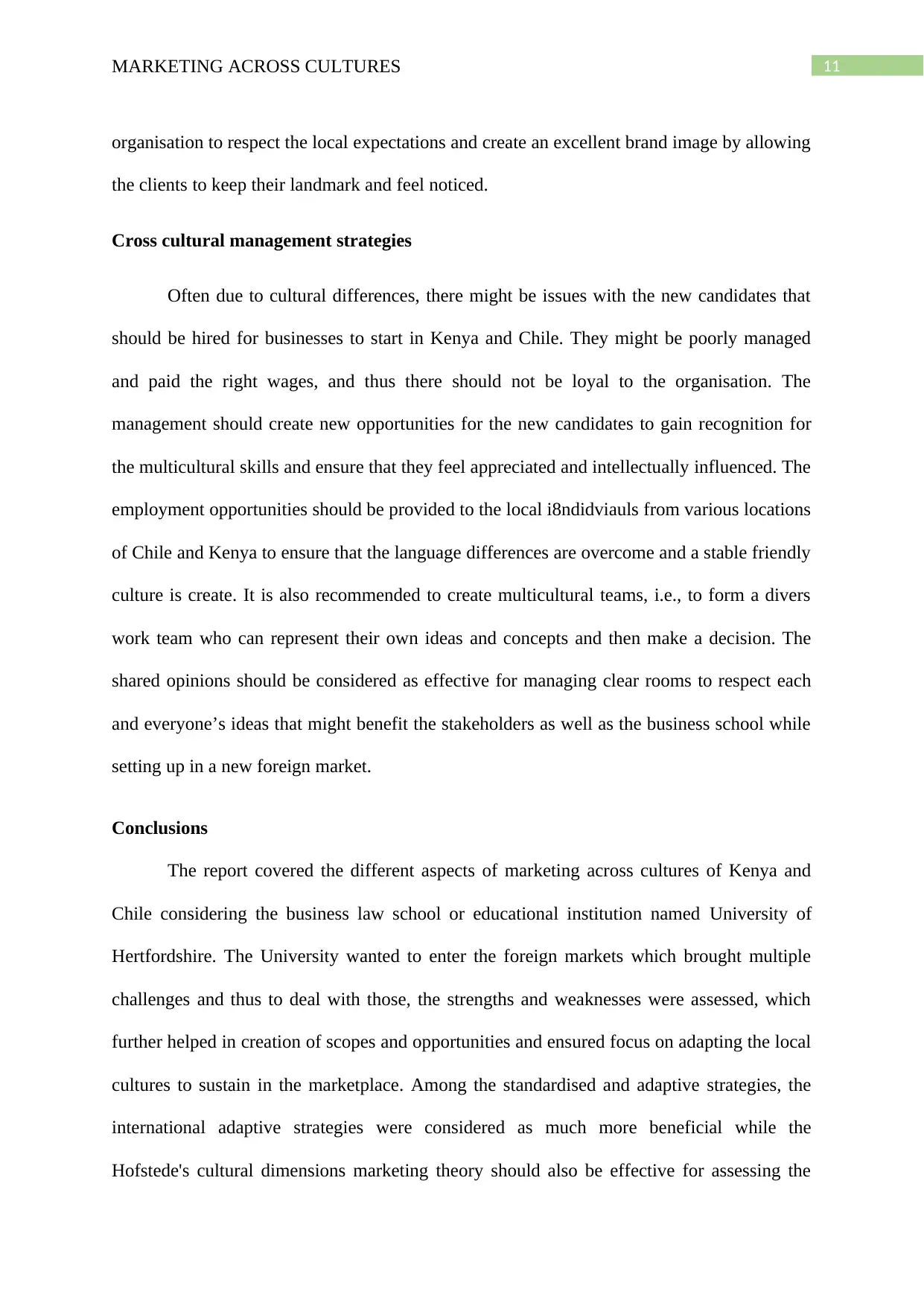
11MARKETING ACROSS CULTURES
organisation to respect the local expectations and create an excellent brand image by allowing
the clients to keep their landmark and feel noticed.
Cross cultural management strategies
Often due to cultural differences, there might be issues with the new candidates that
should be hired for businesses to start in Kenya and Chile. They might be poorly managed
and paid the right wages, and thus there should not be loyal to the organisation. The
management should create new opportunities for the new candidates to gain recognition for
the multicultural skills and ensure that they feel appreciated and intellectually influenced. The
employment opportunities should be provided to the local i8ndidviauls from various locations
of Chile and Kenya to ensure that the language differences are overcome and a stable friendly
culture is create. It is also recommended to create multicultural teams, i.e., to form a divers
work team who can represent their own ideas and concepts and then make a decision. The
shared opinions should be considered as effective for managing clear rooms to respect each
and everyone’s ideas that might benefit the stakeholders as well as the business school while
setting up in a new foreign market.
Conclusions
The report covered the different aspects of marketing across cultures of Kenya and
Chile considering the business law school or educational institution named University of
Hertfordshire. The University wanted to enter the foreign markets which brought multiple
challenges and thus to deal with those, the strengths and weaknesses were assessed, which
further helped in creation of scopes and opportunities and ensured focus on adapting the local
cultures to sustain in the marketplace. Among the standardised and adaptive strategies, the
international adaptive strategies were considered as much more beneficial while the
Hofstede's cultural dimensions marketing theory should also be effective for assessing the
organisation to respect the local expectations and create an excellent brand image by allowing
the clients to keep their landmark and feel noticed.
Cross cultural management strategies
Often due to cultural differences, there might be issues with the new candidates that
should be hired for businesses to start in Kenya and Chile. They might be poorly managed
and paid the right wages, and thus there should not be loyal to the organisation. The
management should create new opportunities for the new candidates to gain recognition for
the multicultural skills and ensure that they feel appreciated and intellectually influenced. The
employment opportunities should be provided to the local i8ndidviauls from various locations
of Chile and Kenya to ensure that the language differences are overcome and a stable friendly
culture is create. It is also recommended to create multicultural teams, i.e., to form a divers
work team who can represent their own ideas and concepts and then make a decision. The
shared opinions should be considered as effective for managing clear rooms to respect each
and everyone’s ideas that might benefit the stakeholders as well as the business school while
setting up in a new foreign market.
Conclusions
The report covered the different aspects of marketing across cultures of Kenya and
Chile considering the business law school or educational institution named University of
Hertfordshire. The University wanted to enter the foreign markets which brought multiple
challenges and thus to deal with those, the strengths and weaknesses were assessed, which
further helped in creation of scopes and opportunities and ensured focus on adapting the local
cultures to sustain in the marketplace. Among the standardised and adaptive strategies, the
international adaptive strategies were considered as much more beneficial while the
Hofstede's cultural dimensions marketing theory should also be effective for assessing the
⊘ This is a preview!⊘
Do you want full access?
Subscribe today to unlock all pages.

Trusted by 1+ million students worldwide
1 out of 15
Related Documents
Your All-in-One AI-Powered Toolkit for Academic Success.
+13062052269
info@desklib.com
Available 24*7 on WhatsApp / Email
![[object Object]](/_next/static/media/star-bottom.7253800d.svg)
Unlock your academic potential
Copyright © 2020–2026 A2Z Services. All Rights Reserved. Developed and managed by ZUCOL.





